-
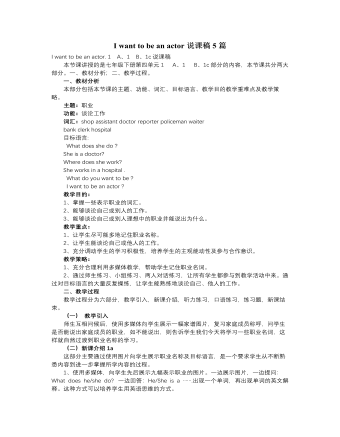
人教版新目标初中英语七年级下册I want to be an actor说课稿5篇
五. 教学过程1.预习展示(Review)在幻灯片上写出预习目标,然后让他们展示他们自己所预习的有关职业名称的词汇. 小组派代表发言.(设计目的:吸引学生注意力,活跃课堂气氛。使课文引入自然)2.检测成果(Checking)(1)展示本课时的单词图片,让学生快速完成。(2)让同学领读,齐读,男女同学读,在齐读。(设计目的:巩固单词的读音,以及纠正错误的读音,加深记忆力.)3.学习新句型(Presentation)用幻灯片出示重点句型,让学生观察、齐读、what do you do ?I’m a student.What do you want to be ? I’m want to be an actor.这些重点句型。(设计目的:培养学生认真观察动脑思考学习如何就职业提问,以及对自己的理想职业进行提问。)4.练习句型(Pattern drills)你是做什么的?What do you do ? 你将来想做什么? What do you want to be ?
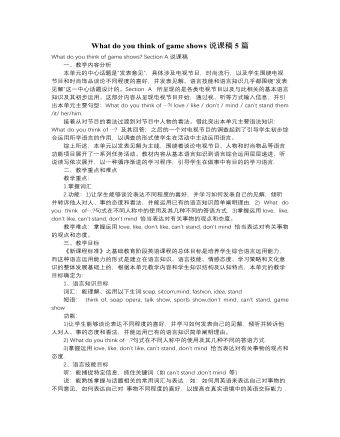
人教版新目标初中英语七年级下册What do you think of game shows说课稿5篇
步骤二 看图学单词我把本单元有关的单词制成图片显示在屏幕上。目的在于通过直观的画面效果和有意义的情景,便于学生更快地把单词的声、形和意联系起来。使学生轻松地掌握这些单词的音、形、义,且充分调动了学生的学习热情,让学生在思考中理解所学的生词。如 sitcom( situation comedy)1.猜。点击屏幕上一副有关情景喜剧的图片。说This is s kind of funny show. We call it sitcom. The people in sitcoms do or say things that make Tv watchers laugh.让学生根据图片和教师的提示猜出单词的意思。这时再告诉学生们sitcom=situation comedy.一定会有很多同学争先恐后地抢答,我们可以挑三个不同层次的学生起来回答,这样做既发挥了优等生的带头作用,同时为待优生树立起学好英语的信心,又增强了其他同学的竞争意识(他会我也会),也融入了教师的情感价值观之中。
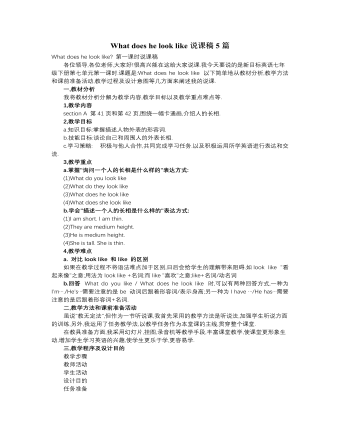
人教版新目标初中英语七年级下册What does he look like说课稿5篇
(四)、小结及布置作业(5’)对于本课的复习要点,我以课堂小结的形式展示给学生。(出示大屏幕)这样学生通过小结,对本课内容能够再次重申,体现出了本课的重点,使知识更加系统化、规范化。为了巩固本课内容,我给学生布置如下家庭作业。(出示大屏幕)课后描述一下你的父母,并写在作业本上四、板书设计(出示电脑屏幕)板书除了课题之外,我将本课的重点词汇always书于板书,并附例句,利于学生掌握该词的用法。并将本课的难点内容be+adj ,have+n.的用法书于板书,并附例句,利于学生突破难点。该板书简洁、清晰、明了,突出了本课的重难点。本课我以素质教育为目的,结合教材的重难点及英语学科的特点,采用任务型教学,从听、说、读、写、练等方面使学生得到了锻炼,在轻松、愉快的氛围中温故而知新,达到了培养学生用英语交际的目的。
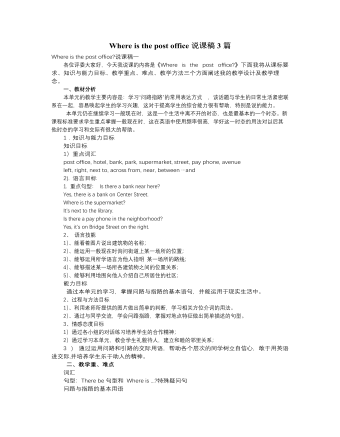
人教版新目标初中英语七年级下册Where is the post office说课稿3篇
Vocabulary:post office, restaurant, bank, supermarket, avenue, pay phone, park, dirty, clean, left, right, next to, across from, near, between, in front of, behindRecycling: hotel, street, new, big, small, busy, Do you want to…?Learning Strategies:Using what you knowDeducingPersonalizingSection ACreate plots and scenes to guide the new lessonThe main content is to learn to ask for and give directions in conversations by introducing some buildings in Section A, so we can adopt the Audiovisual Guiding Method: At first ,review the prepositions that the students have learned, then the teacher can teach some nouns about buildings by showing some pictures or projecting flashcards about some buildings.1. Show a picture of a bank.T:Look at this picture. What place is it ?S:It is a bank.T:Spell it.S: B-A-N-K .Teach other new words : post office, park, supermarket, payphone, street, .Show a map and let students practice in pairs.Is there …… ?Yes, there is. /No, there isn’t.2. Consolidation: Tell us the way to your school.T: Where is the …?S: It’s ….Teach the prepositionsNext to,across from,near,between,in front of,behind.Step1: .Learn some nouns about buildings first, and then the teacher communicates with the students.
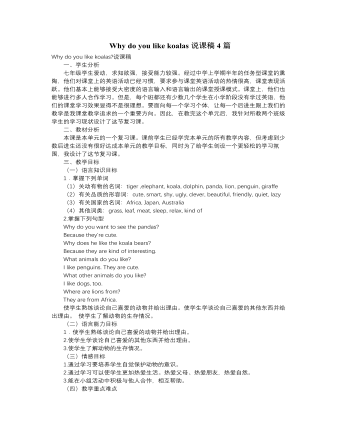
人教版新目标初中英语七年级下册Why do you like koalas说课稿4篇
通过Go for it七上的学习,大部分学生对why/what/where引导的特殊疑问句已具备较强的听说能力,而本单元围绕“animals”的教学活动贴近学生生活,学生有强烈的兴趣和好奇心,使他们产生了解的欲望,有利于引导他们自主学习。本单元的教学内容我是用了三节课完成,又用了第四节来复习。七班的学生大部分性格偏内向,不喜欢表达和展现自己,但大部分同学有一定的英语基础,通过教师的恰当引导,能完成教学任务。教材分析:本单元的topic是animals, 要求学生掌握一些新的动物名词,学会用表示性质和品质的形容词来描述动物,并能用“Why do you like…? Because….” 来陈述喜欢的原因。通过讨论动物,让学生了解大自然,增长地域知识,增进对自然环境的情感;通过讨论自身的喜好及原因,提高学生的认知和思维能力。教材在第一、第二单元的基础上对已有的语言项目进行拓展,符合学生的认知规律,循序渐进。
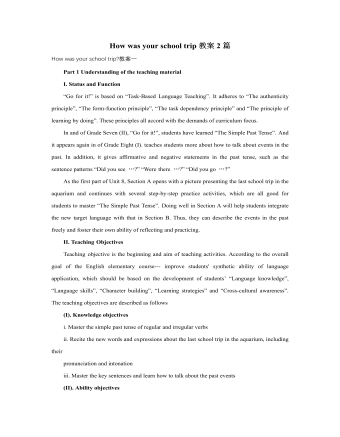
人教版新目标初中英语八年级上册How was your school trip教案2篇
“Go for it!” is based on “Task-Based Language Teaching”. It adheres to “The authenticity principle”, “The form-function principle”, “The task dependency principle” and “The principle of learning by doing”. These principles all accord with the demands of curriculum focus.In and of Grade Seven (II), “Go for it!”, students have learned “The Simple Past Tense”. And it appears again in of Grade Eight (I). teaches students more about how to talk about events in the past. In addition, it gives affirmative and negative statements in the past tense, such as the sentence patterns “Did you see …?” “Were there …?” “Did you go …?” As the first part of Unit 8, Section A opens with a picture presenting the last school trip in the aquarium and continues with several step-by-step practice activities, which are all good for students to master “The Simple Past Tense”. Doing well in Section A will help students integrate the new target language with that in Section B. Thus, they can describe the events in the past freely and foster their own ability of reflecting and practicing. II. Teaching ObjectivesTeaching objective is the beginning and aim of teaching activities. According to the overall goal of the English elementary course--- improve students' synthetic ability of language application, which should be based on the development of students’ “Language knowledge”, “Language skills”, “Character building”, “Learning strategies” and “Cross-cultural awareness”. The teaching objectives are described as follows(I). Knowledge objectivesi. Master the simple past tense of regular and irregular verbsii. Recite the new words and expressions about the last school trip in the aquarium, including their pronunciation and intonation

人教版新目标初中英语八年级上册Could you please clean your room教案3篇
一、 教学内容Section A 1a----1c二、 教学目标1.学习词汇do the dishes, make the bed, take out the trash, fold the clothes, do the laundry, sweep the floor, clean the living room.2.句型 Could you please clean your room? Yes, sure.三、 教学准备 学生预习本单元所有的词汇多媒体课件 活动表 奖品四、 教学过程Pre-task1. Warming upEnjoy ourselves. Watch cartoon Cinderella. 看动画片段《灰姑娘》导如入本课话题和新词汇“chores”美丽善良的鬼姑娘因继母的嫉妒,每天得做所有的家务。片段的主题使学生联想到本课的话题。2. learn new words and phrasesLook! What is she / he dong? 看图学习动词词组do chores, do the dishes, make the bed, take out the trash, fold the clothes, do the laundry, clean the living room.3. Guessing game.What is she doing ? 4. Pair work. 1a, Do you do these things at home? Write “Y” for “yes” and “N” for “no”.5. Listening . 1b , Peter’s chores or Mom’s chores?理解目标语Could you please clean your room? Yes, sure.Write “M” for Mom’s chores, “P” for Peter’s chores in the chart.6. PairworkLook at the picture,Ask your partner to do the chores that you see. 7. Interview Who is the most able at home? 1) What chores do you do at home? How often do you do the chores? Work in four, interview each of the students in the group, fill in the chart.

人教版新目标初中英语八年级上册How do you get to school教案2篇
Step Ⅶ Role play ( Work on 1b)1. First ask two students to read the dialogue to the class.Sa: How do you get to school?Sb: Well, I ride my bike to the subway station. Then I take the subway.2. Now work with a partner.Suppose you use two kinds of transportation to get to school \Hangzhou\Beijing... (bus, train, subway, walking, bike, etc.) Tell how you get there. You may use the phrases in 1a.3. Then ask different pairs of students to present their conversations to the class.Step ⅧListening1. Work on 2a(1) First ask students to read the list of information that Thomas wants to know.…where Nina lives.…how far from school she lives.…how long it takes to get to school.…how she gets to school.…what she thinks of the transportation.(2) Tell students what transportation and bus stop mean.bus stop 汽车站 transportation n. 运送;运输Then tell students we'll hear a recording. Please put a checkmark in front of each thing that Thomas wants to know.(3) Now play the recording for students.( Have students pay attention to the sample answer.) (4) Then correct the answers.

人教版新目标初中英语八年级上册What are you doing for vacation教案2篇
Teaching goals : 1. Words & phrases: babysit ,get back , fishing , rent , think about , decide(on) , tourist etc. 2. How to talk about future plans . 3. 现在进行时表示将来计划或行动. 4. 特殊疑问句(where , when , how long引导) Important and difficult points : Drills :What are you doing for vacation ? I’m watching TV . When are you going ? I’m going … . How long are you staying ? We’re staying for five days . Teaching aids : cards and a tape ,a large wall calendar . Period 1 Teaching procedures : Step 1Leading in1. Free talk . 2. Put up the wall calendar . T: I’m staying home on Saturday (pointing to next Saturday ).Ss repeat . Ss: I’m staying home on Saturday . T: OK. Today we’ll learn how to talk about future plans. Step 2Pre-task SB Page 13 , 1a . 1. Look at the picture carefully and tell what you see in the picture . 2. Write the activities from the pictures in the box and add some more . 3. Practice reading . Step 3While-task1. Using the activities we write in 1a to make conversations .For example :What are you doing for vacation ? I’m visiting my uncle . 2. Pairwork .Practice in pairs . 3. 用第三人称练习对话.
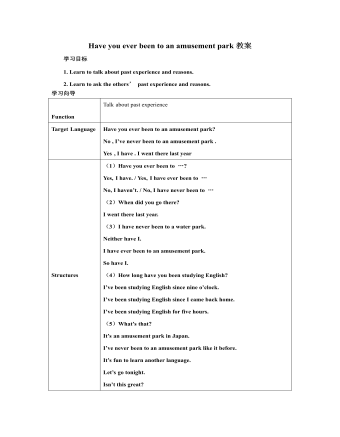
人教版新目标初中英语八年级下册Have you ever been to an amusement park教案
(1)Have you ever been to …? Yes, I have. / Yes, I have ever been to …No, I haven’t. / No, I have never been to …(2)When did you go there? I went there last year. (3)I have never been to a water park. Neither have I. I have ever been to an amusement park. So have I. (4)How long have you been studying English? I’ve been studying English since nine o’clock. I’ve been studying English since I came back home. I’ve been studying English for five hours. (5)What’s that? It’s an amusement park in Japan. I’ve never been to an amusement park like it before. It’s fun to learn another language. Let’s go tonight. Isn’t this great?space museum, amusement park, water park, South America, Peru, Holland, European culture, tour guide, flight attendant, musical instrument, more than, be from, get to, take lessons, neither, discover, graduate, change
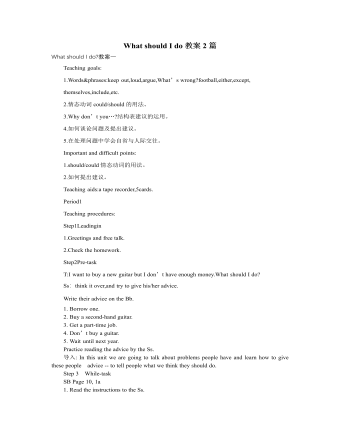
人教版新目标初中英语八年级下册What should I do教案2篇
说明:在帮Li Lei提建议的同时,教育学生如何学好英语。第三课时教学目标1. 语言目标:a) 词汇: Original, in style, haircut, the same as.b) 语言结构:My friend wears the same clothes and has the same haircut as I do.2. 能力目标:大多数学生能够谈论自己喜欢哪种服装,提高查找信息的能力。3. 情感目标:学会如何与朋友相处,要有自己对时尚的看法。教学重点掌握一些重要词汇。教学难点学会谈论问题,并能提出书面建议。◆教学突破首先针对Erin的问题,提出个人的建议,模仿2c部分的对话展开双人交际Pair-work;听老师诵读3a部分的信件,并找出LEFT OUT的问题所在;学生完成3b部分的内容,给Left Out提出书面的建议;学以口头形式提出自己目前存在的某个问题,讲给大家听,让同学们给自己提出一个建议,并作笔录;学生两、三个人分成一组,随意性地进行口语交际,谈论P14的第4部分的某个问题,相互交换意见。
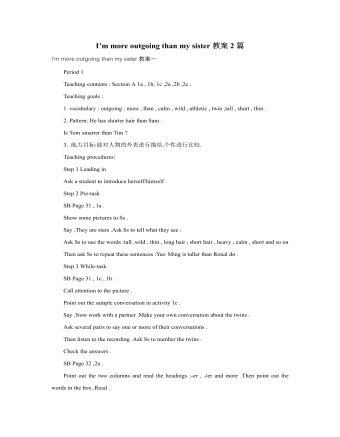
人教版新目标初中英语八年级上册I’m more outgoing than my sister教案2篇
1 交通工具的比较此活动为小组活动。学生通过讨论找出到达某一城市可乘坐的各种交通工具,并选择最佳出行方式。Teacher:We’re going to Shanghai. How many ways can we use to get there? Yes, there are four ways: by bus, by plane, by train, by ship. Please discuss how you are going to get there.操作建议:(1)学生以小组为单位展开活动,谈论本组所选择的交通工具。(2)各组选代表向全班汇报,阐述本组所选择的交通工具的利和弊。完成任务所需要的语言结构:We can go there by ship. It’s more comfortable and cheaper than any other transportation.We can go there by bus. It’s cheaper but it takes longer time.2 哪个城市更合适?此活动具有挑战性。假设中国要举行2014年世界杯足球赛,分别从历史,人文,天气等方面对各城市(北京,大连,上海,昆明)进行比较,选择最佳举办城市。T: Imagine China is holding the 2014 FIFA World Cup. Which city do you think is the best for the World Cup, Beijing, Dalian, Shanghai or Kunming? Let’s work in groups. If you choose Beijing, please join the Team Red. If you chose Dalian, please join the Team White. If you choose Shanghai, please join the Team Blue. If you choose Kunming, please join the Team Green. Please show us its advantages. Then let’s see which team will win.
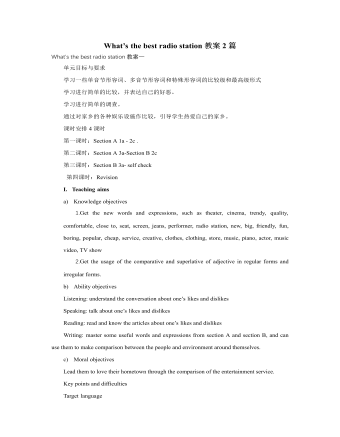
人教版新目标初中英语八年级上册What’s the best radio station教案2篇
教学重点和难点:运用所掌握的语言描述,比较不同地点的特点。在练习中学习掌握英语比较级和最高级的用法。课前准备分配小组,每组五至六人。通过上网或翻阅报刊杂志等方法,确定旅游线路,做出基本的旅游计划。教学设计:本节课流程图 学法指导:1.由于这是一堂新课,在教学中应注意面向全体,发挥学生的主体性,引导学生积极参与,激发学生的求知欲和学习积极性,指导学生积极思维,主动获取知识,养成良好的学习方法。逐步学会独立解决问题。总之要尽可能调动学生的非智力因素促进智力因素的发展。教法选择:1.电化教学法2.课堂讨论法3.任务型教学法采用这些方法的目的是为了充分调动学生的学习积极性,使学生变被动学习为主动学习。通过电脑形象的演示,加强印象,提高兴趣,突破难点,提高教学效率,进而增大教学的容量和信息量。充分体现教师为主导,学生为主体的教学原则。
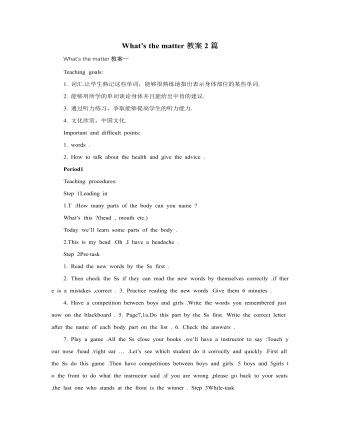
人教版新目标初中英语八年级上册What’s the matter教案2篇
She shouldn’t go to the party tonight.Step7. TaskT: You know, there are lots of problems in our life. If you are a doctor, please tell us how to solve the problem. I will divide you into 9 groups. Please work in groups. And then choose one of you to report your ideas.The following are the problems:I have a toothache.I am hungry. I have a sore throat.I am stressed out. I have a sore back.I am tired. I can’t sleep.I have a cold. I have a headache.Report: If you have a headache, you should go to bed early. You should see the doctor. You should eat some medicine. You shouldn’t wash your face with cold water.You shouldn’t sleep late.You shouldn’t swim.…..T encourages the students to give advice as much as possible.Homework:1. Chose one of the problems, and write down your advice2. Copy the new words这一步是用于热身的,同时也可以让他们复习一部分的表示人体部位的单词,扩充知识.学习语言的过程也是一个不断积累的过程,复习旧知识,增添新知识.通过小游戏,强化学生对Does she/he have…这个句子的运用能力.通过复习,自然的引到下面新知识的学习。充分利用表格,由句子到对话,再到文章,让学生循序渐进. 提高学生的综合语言运用能力,运用以前学过的知识来解决身边的问题.Period 5 (Section B 3a—3c, selfcheck)教学内容与分析:
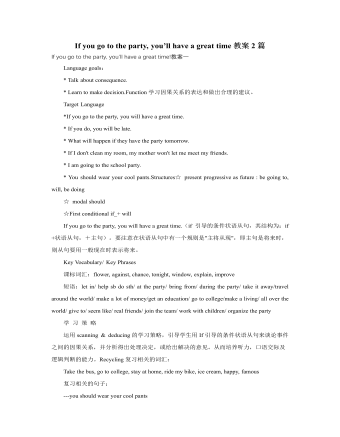
人教版新目标初中英语八年级下册If you go to the party, you’ll have a great time教案2篇
区分宾语从句、定于从句和状语从句宾语从句和状语从句,都叫做主从复合句。宾语从句主要是中考必考的,是初中阶段必掌握的从句,宾语从句主要是掌握三要素,所谓宾语从句,就是宾语在主从复合句当中充当宾语的一个句子,叫做宾语从句。主句的谓语动词是及物动词,后面如果是词或者是短语的话,是简单句,如果是句子的话,肯定是宾语从句。I know that he good at English.就是宾语从句,三要素,一要素是要注意连词,连词一共学了三类连词,一类连词是that口语当中可以省略,就像刚才说的那一句,I hear he is good at English.还有疑问代词、疑问副词,how where when,疑问代词、疑问副词。还有一类连词weather是否的意思,不是状语从句当中的如果,这一定要和如果区分开,这是是否。I don't know if he interested at English。宾语从句要注意if是连词。第二要素是语序,要用陈述举语序。比如说你家有几口人,我们都说How many people are there in you family?但是这是简单句,一旦说成宾语从句,你可以告诉我你家有几口人吗?Could you tell me how many people there are in you family ?

人教版新目标初中英语八年级下册It’s a nice day, isn’t it教案2篇
"Hello! Welcome to English class! Introduce yourself. Meet your new classmates." That's what the teacher says. What do you say? "Oh no!" It can be difficult talking to new people. But it can be fun, and you can make friends. How do you do it? Make small talk. Small talk is polite conversation. "Wang Nan is a great pingpang player, isn't she?" "I'd love to meet her, wouldn't you?" "It's been raining a lot, hasn't it?" Tag questions are a form of polite speech. To make small talk successfully, you should know how to make them. You should also know what topics to talk about. Try to learn this unit carefully. The next time you're in English class, you'll find out. Making small talk's easy, isn't it? (“你好!欢迎你!请做一下自我介绍。认识一下你的新同学。”通常在课上老师会这样说。你会说什么呢?“噢,不!”与陌生人谈话太困难了。但是这也很有意思,并且你还能交到朋友。你该怎么做呢?闲聊。闲聊指得是礼貌的对话。“王楠是一个很棒的乒乓球运动员,不是吗?”“我希望自己能认识她,你呢?“今年的雨水很多,不是吗?”反意疑问句是一种礼貌用语。为了使得谈话成功,你应该知道怎样去进行闲聊。你还应该知道与不同的人该谈论什么样的话题。认真的学习这个单元吧,下次在英语课上,你会发现与大家展开谈话是一件很容易的事情,不信我们来试试。)

人教版新目标初中英语八年级下册He said I was hard-working教案2篇
This activity introduces some new vocabulary and provide oral practice using the target language.Task 1 . Ask four students to stand in front of the class, and the teacher asks them the following questions as a reporter.1.What are you going to do when you grow up?2.What are you going to do next week?3.What are going to do after school?The students will give different answers, then ask a good student to report what they said.I am going to e a doctor.What did she say?----------She said she was going to be a doctor.I am going to have a party on Friday night.What did he say?-------He said he was going to have a party on Friday night.I am going to do my homework.What did she say ?------ She said she was going to do her homework.I am going home after school.What did she say?-----She said she was going home after school.Say In this unit we are going to learn to use words like to report what someone said.Task 2. Read the instructions. Then ask a student to read the four questions. And write the words on the Bb. Explain what soap opera is.Task 3. Ask the students to Look at the pictures, point out the TV screens in the picture. Ask one girl to read what Marcia said.What did Marcia say? She said She said she was having a surprise party for Lana on Friday night. Repeat the other pictures in the same way.Activity3. Listen and number the pictures in activity 1a.
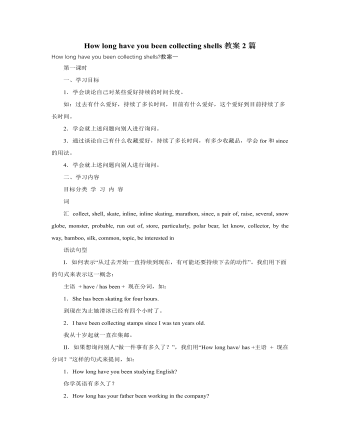
人教版新目标初中英语八年级下册How long have you been collecting shells教案2篇
Step Ⅱ Show the new words on the screen and teach the new words. Read the new words to students and ask them to repeat.Step Ⅲ 3aThis activity introduces new vocabulary and provides reading practice using the target language.In this activity first look at the four pictures.T: What can you see in the pictures?Ss: Four snow globes.T: Right. There are four snow globes in the pictures. And what are they?Ss: They are a monster, two polar bears, two penguins and a birthday cake.Write these words on the blackboard: snow globe; monster; polar bear; penguin and birthday cake. Read them to the class and ask students to repeat each one. Make sure students understand each word.Use a computer to show the E-mail message on the screen and read the message to students.Get students to read the e-mail on their own, and then draw lines connecting each snow globe and its description.Correct the answers.AnswersA line should connect each snow globe picture with the words that describe it in the letter.Step Ⅳ 3bThis activity provides writing practice using the target language.First review Activity 2a on Page 47.Then ask students to complete the message according to Activity 2a.Some partial sentences are given to students. Write about one person's collection.When students work, walk around the room checking the progress and offering help as needed.When they finish, ask some students to read their messages to the class.
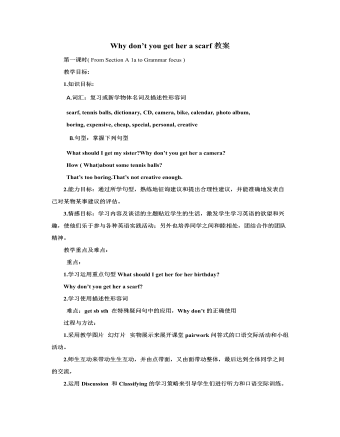
人教版新目标初中英语八年级下册Why don’t you get her a scarf教案
教师带领学生复习有关描述宠物的词汇,采用教师提问学生回答的方进行。如:T:What animals do you think would be good pets?What animals do you think would be bad pets?What do you think are good animals for a six-year-old child?然后学生进行 pairwork 练习。Task two: 师生互动,学习探究 1、播放3a部分的录音,引导学生一边听录音,一边跟读。2、通过听录音学生回答以下问题:Why do you think pot-bellied pigs are popular?What are the advantages and disadvantages of keeping such a pet?教师对学生的回答进行及时点评。3.学习范文,学习重点短语,为下步的模仿写作提供语言素材。T :1. )Have you ever kept a pig as a pet?Do you like pigs? St.:No.…Why don’t you like to keep a pig? St: No.They’re too dirty and lazy(Do you know in some foreign countries like Hollyland, Australia,pigs are the most popular pet.there’s a kind of pig.(图)it has an interesting name? it ‘s called a pot-bellied pig.) Now,let’s learn an article about this kind of interesting pet.2.)play the tapeSt.:Listen and repeat3.)show some Qs on computer(本子St.: read silently,then answerthe Qs(本子)4.)Ask ss. Close book and retell this passage.(what is a pot-bellied pig? Is it a good or bad pet? ) St.: retell it to each other“A pot –bellied pig is a popular pet now…”5.read the article together.St.:.practice reading
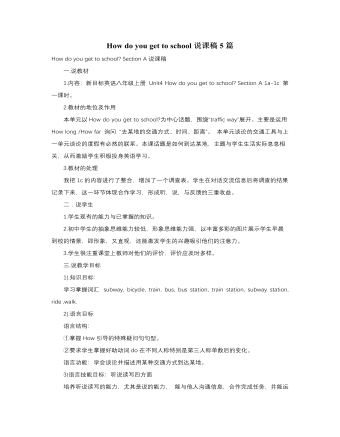
人教版新目标初中英语八年级上册How do you get to school说课稿5篇
难点:1.学会谈论并描述使用某种交通工具到达某地。2.要求学生掌握好助动词do在不同人称特别是第三人称单数后的变化。通过合作学习将听说读写有机地结合起来,切实做到任务密集度适中,节奏合理,环节与环节之间过渡自然,让学生一步步登上高峰突破难点。五.说教学策略:1.教学手段分析:针对低起点的学生,在学习过程中通过“兵交兵,小组训练,鼓励性评价”等扶路措施,提高低起点学生的语言技能。针对高起点的学生要拔高学习目标,同时又能较好地运用到实践中去。2.教学方法分析:本课主要以“任务型教学法”并辅助与情境交际法完成任务的。在教学活动中采用任务型教学法让学生的学习活动具有明确的目标,并构成有梯度的连续活动。学生从注重语言本身转变为注重语言习得,从而获得语言运用的能力。我还采用情境交际法给学生足够的听,说的机会,联系实际,创设情景,在交际中学英语。

